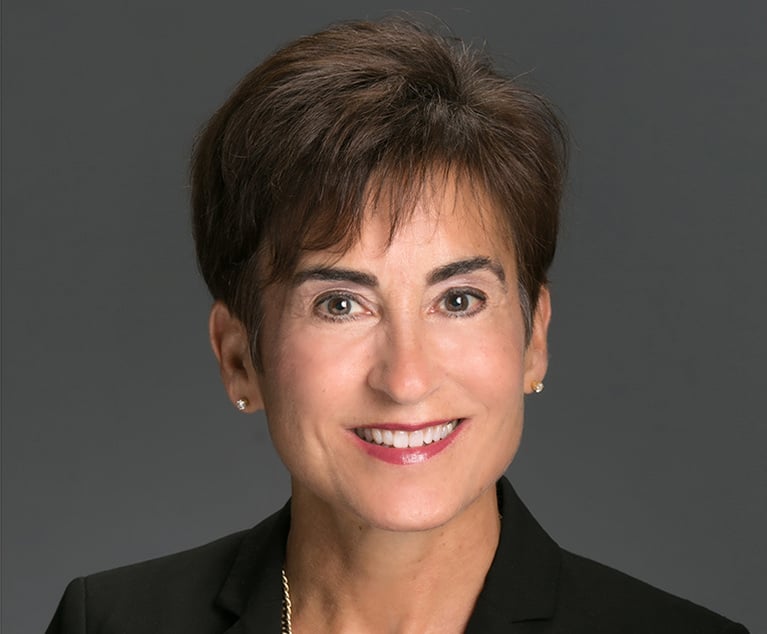'Do Better': Holland & Knight Team Asks SCOTUS to Review Bar's Approach to Mental Illness
They say the Illinois bar violated the Americans with Disabilities Act when it denied admission for a law-school graduate who is undergoing treatment. "They can't prove that they're worthy of a second chance unless we're willing to give them a second chance," Trisha Rich says.
June 09, 2020 at 05:50 PM
7 minute read
The original version of this story was published on The American Lawyer
 Trisha Rich, left, and Laurie Webb Daniel of Holland & Knight.
Trisha Rich, left, and Laurie Webb Daniel of Holland & Knight.
Thomas Skelton was poised to join the Illinois bar after graduating from John Marshall Law School and passing the statewide exam in 2017. But he was tripped by one final hurdle when the committee on character and fitness declined to certify him, pointing to ongoing symptoms of mental illness. Experiencing delusional thoughts while his application was under review, Skelton sent approximately 40 emails to the committee's members impugning the integrity of their organization and the wider legal system.
Skelton's attorneys, Holland & Knight legal profession co-chair Trisha Rich and appellate chair Laurie Daniel, say the committee ignored testimony showing that he has his symptoms under control, thanks to medication. And they're now asking the U.S. Supreme Court to review a ruling by the Illinois justices that let the state bar committee's decision stand. They contend that the licensing board is violating the Americans with Disabilities Act by not providing Skelton reasonable accommodations in certifying his admission. Rich and Daniel spoke with ALM this week about the significance of their case, after filing their petition with the Supreme Court on Friday.
Dan Packel: How did the board go wrong on this issue?
Trisha Rich: Mr. Skelton's alleged bad behavior was a direct result of his medical condition. It's a behavior that is a manifestation of a diagnosed, and now treated, medical condition. For the board to point to that behavior, which frankly is fairly low-level inappropriate behavior, and say, "We're going to keep you out of the bar because of this," we think is a violation of the Americans with Disabilities Act.
DP: Has this issue, or variants on this issue, been litigated before?
TR: Not at this level. One of the frustrating things about not only character and fitness cases but bar discipline cases is that in most cases the petitioner is disincentivized from appeal processes like this one. Our client, for instance, could wait two years and apply again. In most cases, it is better for petitioners to not rock the boat, keep their nose clean and try again in two years.
Laurie Daniel: It's something of a case of first impression. That's partly because it's coming up through a unique forum. Every once in a while, though, you have something that comes up in a different avenue and presents a compelling issue, and we're hoping the court will recognize that here.
DP: With the increased focus in the profession on mental health pressures, is that one of the explanations for bringing the case forward in this fashion, rather than just the waiting for two years for another crack at it?
TR: I think our client's going to do both, right? Certainly, the increased visibility of mental health issues in the profession makes this a really interesting case for this time. Here, we have our client, who behaved in some pretty low-level inappropriate behavior that was a result of a mental health disorder that he subsequently was properly diagnosed with, properly treated with, and now has completely under control—and still is being frozen out of the Illinois bar.
Personally, I think that if we are going to be a profession that does care about mental health issues in the way that we say that we care about mental health issues, we have to do better by the lawyers and law students who go out and do all the things we asked for: get diagnoses, get treatment, are consistent with their treatment, are doing better. The frustrating thing is they can't prove that they're worthy of a second chance unless we're willing to give them a second chance.
DP: You make the argument in your brief that the Illinois Supreme Court's ruling will have a wider impact on attorneys dealing with mental health issues. What do you fear will happen if that decision stands?
TR: I think it has a chilling effect. We have a problem in the profession with mental health, and we want to encourage people to get better: enter the program, get the health they need and maintain that healthful lifestyle. What we think is really important is that when people do that, we show them that there is a path forward.
DP: Are there any other pieces of the puzzle that I haven't touched on?
LD: [This case] reminded me of a really significant mental health case that came down just slightly over 20 years ago, when I was asked to represent the ACLU as amicus curae in the Olmstead v. L.C. case. It wasn't your typical circuit-split type case. What that case entailed was the state of Georgia was taking mentally ill individuals and restricting them into institutional care even though their treating physicians had recommended that they be placed in community housing.
It was not a constitutional issue in front of the Supreme Court. The question there was whether the state had an obligation under the ADA to provide a reasonable accommodation. The Supreme Court granted cert and ruled in favor of L.C. For me, it was resounding, and that Olmstead case was a landmark decision for mental health. There's an institutional arrogance that I see coming through here that reminds me of institutional arrogance we saw by the state of Georgia, saying it could do whatever it wanted to segregate people with mental health issues.
It seems to me that the Illinois bar issue similarly reflects some institutional arrogance, where the bar acts like a sovereign and it's just going to decide things without providing the accommodation that's required by the ADA.
One of the disappointing things is that this case did have the treating physician testify, and there was not counter-testimony to what they were saying. You had five lawyers, who are laypeople who've not had any medical training, analyzing the medical testimony and substituting their own judgment over that of the treating physician.
My second point—you're probably familiar with the Stanford study [on expanding access to the legal profession for those with criminal records] that got released last year. One of the most helpful things they had in there is that the character and fitness committees should include people that have backgrounds in psychological disorders or mental health disorders. I think that would be really helpful for people like Mr. Skelton. We know that one-third of lawyers and law students have had some sort of mental health illness. I think it would make a lot of sense to incorporate people with that kind of training and background into the process.
Read More
Amid the Pandemic, These Law Firms Are Sticking With Their Mental Health Programs
Lawyers Reveal True Depth of Mental Health Struggles
'How Do You Get People to Care?' Firm Leaders, Experts Discuss Mental Health at LegalWeek 2020
This content has been archived. It is available through our partners, LexisNexis® and Bloomberg Law.
To view this content, please continue to their sites.
Not a Lexis Subscriber?
Subscribe Now
Not a Bloomberg Law Subscriber?
Subscribe Now
NOT FOR REPRINT
© 2025 ALM Global, LLC, All Rights Reserved. Request academic re-use from www.copyright.com. All other uses, submit a request to [email protected]. For more information visit Asset & Logo Licensing.
You Might Like
View All
Landlord Must Pay Prevailing Tenants' $21K Attorney Fees in Commercial Lease Dispute, Appellate Court Rules
4 minute read
State Appellate Court Settles Fee Battle Between Former Co-Counsel in Patent Litigation
5 minute read
Return to Work Mandates Among Current Mental Health Stressors for Legal Professionals
1 minute read
Internal GC Hires Rebounded in '24, but Companies Still Drawn to Outside Candidates
4 minute readLaw Firms Mentioned
Trending Stories
Who Got The Work
J. Brugh Lower of Gibbons has entered an appearance for industrial equipment supplier Devco Corporation in a pending trademark infringement lawsuit. The suit, accusing the defendant of selling knock-off Graco products, was filed Dec. 18 in New Jersey District Court by Rivkin Radler on behalf of Graco Inc. and Graco Minnesota. The case, assigned to U.S. District Judge Zahid N. Quraishi, is 3:24-cv-11294, Graco Inc. et al v. Devco Corporation.
Who Got The Work
Rebecca Maller-Stein and Kent A. Yalowitz of Arnold & Porter Kaye Scholer have entered their appearances for Hanaco Venture Capital and its executives, Lior Prosor and David Frankel, in a pending securities lawsuit. The action, filed on Dec. 24 in New York Southern District Court by Zell, Aron & Co. on behalf of Goldeneye Advisors, accuses the defendants of negligently and fraudulently managing the plaintiff's $1 million investment. The case, assigned to U.S. District Judge Vernon S. Broderick, is 1:24-cv-09918, Goldeneye Advisors, LLC v. Hanaco Venture Capital, Ltd. et al.
Who Got The Work
Attorneys from A&O Shearman has stepped in as defense counsel for Toronto-Dominion Bank and other defendants in a pending securities class action. The suit, filed Dec. 11 in New York Southern District Court by Bleichmar Fonti & Auld, accuses the defendants of concealing the bank's 'pervasive' deficiencies in regards to its compliance with the Bank Secrecy Act and the quality of its anti-money laundering controls. The case, assigned to U.S. District Judge Arun Subramanian, is 1:24-cv-09445, Gonzalez v. The Toronto-Dominion Bank et al.
Who Got The Work
Crown Castle International, a Pennsylvania company providing shared communications infrastructure, has turned to Luke D. Wolf of Gordon Rees Scully Mansukhani to fend off a pending breach-of-contract lawsuit. The court action, filed Nov. 25 in Michigan Eastern District Court by Hooper Hathaway PC on behalf of The Town Residences LLC, accuses Crown Castle of failing to transfer approximately $30,000 in utility payments from T-Mobile in breach of a roof-top lease and assignment agreement. The case, assigned to U.S. District Judge Susan K. Declercq, is 2:24-cv-13131, The Town Residences LLC v. T-Mobile US, Inc. et al.
Who Got The Work
Wilfred P. Coronato and Daniel M. Schwartz of McCarter & English have stepped in as defense counsel to Electrolux Home Products Inc. in a pending product liability lawsuit. The court action, filed Nov. 26 in New York Eastern District Court by Poulos Lopiccolo PC and Nagel Rice LLP on behalf of David Stern, alleges that the defendant's refrigerators’ drawers and shelving repeatedly break and fall apart within months after purchase. The case, assigned to U.S. District Judge Joan M. Azrack, is 2:24-cv-08204, Stern v. Electrolux Home Products, Inc.
Featured Firms
Law Offices of Gary Martin Hays & Associates, P.C.
(470) 294-1674
Law Offices of Mark E. Salomone
(857) 444-6468
Smith & Hassler
(713) 739-1250








